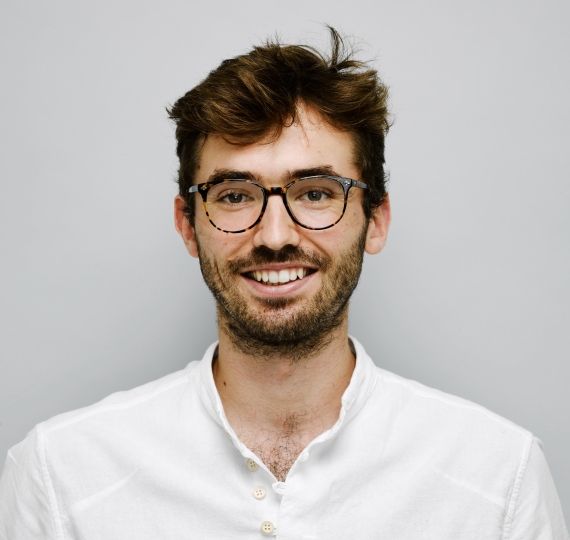A nascent Cambridge-based start-up is seeking to create a revolutionary implantable brain-machine interface with the goal of improving the treatment of neurological disorders, while avoiding damage associated with long-term brain implantation. Paul Le Floch, Ph.D. ’21, co-founder of Axoft, hopes to develop minimally invasive, nanoscale neural probes that would seamlessly connect the brain to electronics.
“It’s a material science problem that’s due to the mechanical mismatch between brain tissues and electronic materials,” said Le Floch, who defended his Ph.D. in mechanical engineering and material sciences in June at the Harvard John A. Paulson School of Engineering and Applied Sciences (SEAS). “Right now, the problem with brain implants is that the benefits to the patient are rarely strong enough to balance the risks and natural aversion toward brain surgery. The technology and the platform need to be improved to the point where it’s going to be more community-accepted, where the surgery is going to be less invasive, where the device is not going to trigger so much damage to the brain over time, and the capabilities of the implanted brain-machine interface will provide clear benefits for patients.”
Axoft is betting that softer implants, compared to those currently on the market, will be more scalable and stable over time in soft biological tissue, like in the brain. Overcoming and avoiding further brain damage is Le Floch’s goal.
“It’s been shown that you can treat people with drug-resistant depression or Parkinson’s by doing brain stimulation,” Le Floch said. “It seems like a solution to actually help patients and reduce pain. We want this technology to be accepted, like a pacemaker or a cochlear implant are accepted. We want to build the same technology for the brain.”
Neural probes could eventually be used to communicate with prosthetic limbs and other man-made peripherals, Le Floch said.
Le Floch came to SEAS in 2016 after earning bachelor’s and master’s degrees in his home country of France, where he first developed an interest in bioelectronics and stretchable electronics. At Harvard, he initially worked with Zhigang Suo, Allen E. and Marilyn M. Puckett Professor of Mechanics and Materials, and switched labs to become the first graduate student of Jia Liu, Assistant Professor of Bioengineering, an Axoft co-founder and scientific advisor.
The two eventually co-founded Axoft, along with Tianyang Ye, Ph.D. ’20, with the intent to commercialize innovations developed at SEAS.
“There is a lot of potential with current electronics to be interfaced with the body, but at the same time we struggle so hard to combine them,” Le Floch said. “It’s very interesting to realize that we have some understanding of the brain, in the way that it has billions of neurons communicating with each other, and we build computers with billions of computing-unit transistors, but somehow we can’t link them.”
Le Floch recently received the Materials Research Society Graduate Student Gold Award and was named to the 2022 Forbes 30 Under 30 Science list. The latter award came after Le Floch raised nearly $1 million in pre-seed funding for Axoft while finishing his Ph.D.
“The technology is exciting for people, potential patients and clinicians,” he said.
Le Floch still has many steps left to bring neural probes to the public, and the emerging startup is currently negotiating a technology license with Harvard’s Office of Technology Development. He wants to recruit more researchers to Axoft, and medical devices must undergo a rigorous approval process from the U.S. Food and Drug Administration.
“Two years ago, I would never have told you I was going to start a company,” he said. “I was passively learning, I was taking in information like a sponge, but I was not actively pursuing this goal. This idea was on the back burner, waiting for concrete scientific evidence to come to realization. It’s definitely thanks to the environment, the fact that I was exposed to so many start-ups, so many ties between industry and academia, the nature of Harvard SEAS, and also my personal vision of the Ph.D.”
Press Contact
Matt Goisman | mgoisman@g.harvard.edu
